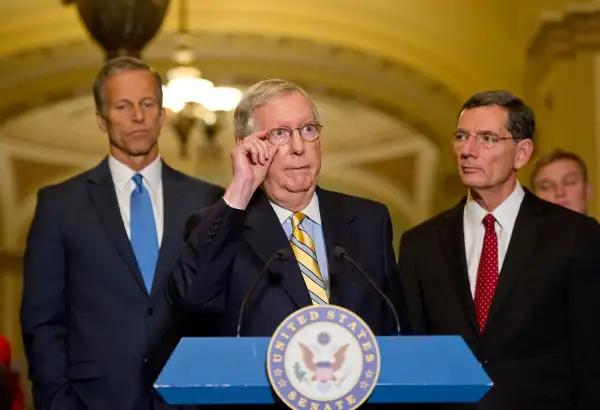This Chart Shows Just How Much the Senate Health Care Bill Helps the Rich

Ever since the House passed a plan to replace Obamacare in May, the Senate has been hard at work on its own version. Yet getting the Better Care Reconciliation Act through the chamber, where the Republicans currently enjoy a slim two-vote majority, has proved tough for majority leader Mitch McConnell. That's because the bill, which attracted no support from Democrats, has also turned off moderate Republicans like Maine's Susan Collins and Nevada's Dean Heller.
A new study, released Tuesday, offers one reason why: The measure dramatically favors the wealthiest Americans, at the expense of the least well off. The study, conducted by the Tax Policy Center -- a joint venture of the Brookings Institution and Urban Institute and the Urban Institute's Health Policy Center -- used economic models to estimate the effect of the Senate health bill's impact on Americans in all different income groups.
As the following chart shows, the bill's tax cuts -- in particular, lower payroll and investment income taxes for the wealthy -- would significantly benefit top earners. The roughly 14 million American families earning $200,000 or more would enjoy an annual net benefit of roughly $5,400 a year by 2026, when the law would be fully implemented, the study found.
Poorer families would not benefit significantly from the bill's tax cuts, and would be hurt by other provisions, which include less generous health insurance tax credits and less generous Medicaid spending than what they would be able to count on under Obamacare.
In one of the bill's most draconian shifts, the roughly 15 million poorest families in the U.S. -- those who earn less than $10,000 a year -- would suffer a loss of more than $2,500 per year, largely in reduced benefits. Even families earning as much as $75,000 would still be worse off under the bill, on average, if only slightly.
Will the rich really get a tax cut this big? It's certainly possible, since the breakdown of winners and losers in the House bill is similar. And it's no secret that President Trump is eager to make good on his promise to repeal and replace Obamacare.
But it's far from a sure thing. As McConnell works to get the bill passed, he is expected to unveil a new version later this week, possibly scaling back on tax cuts. That could significantly change the calculus -- but it could also set up future battles with Senate conservatives and put it in conflict with the House's version of the Obamacare repeal.
